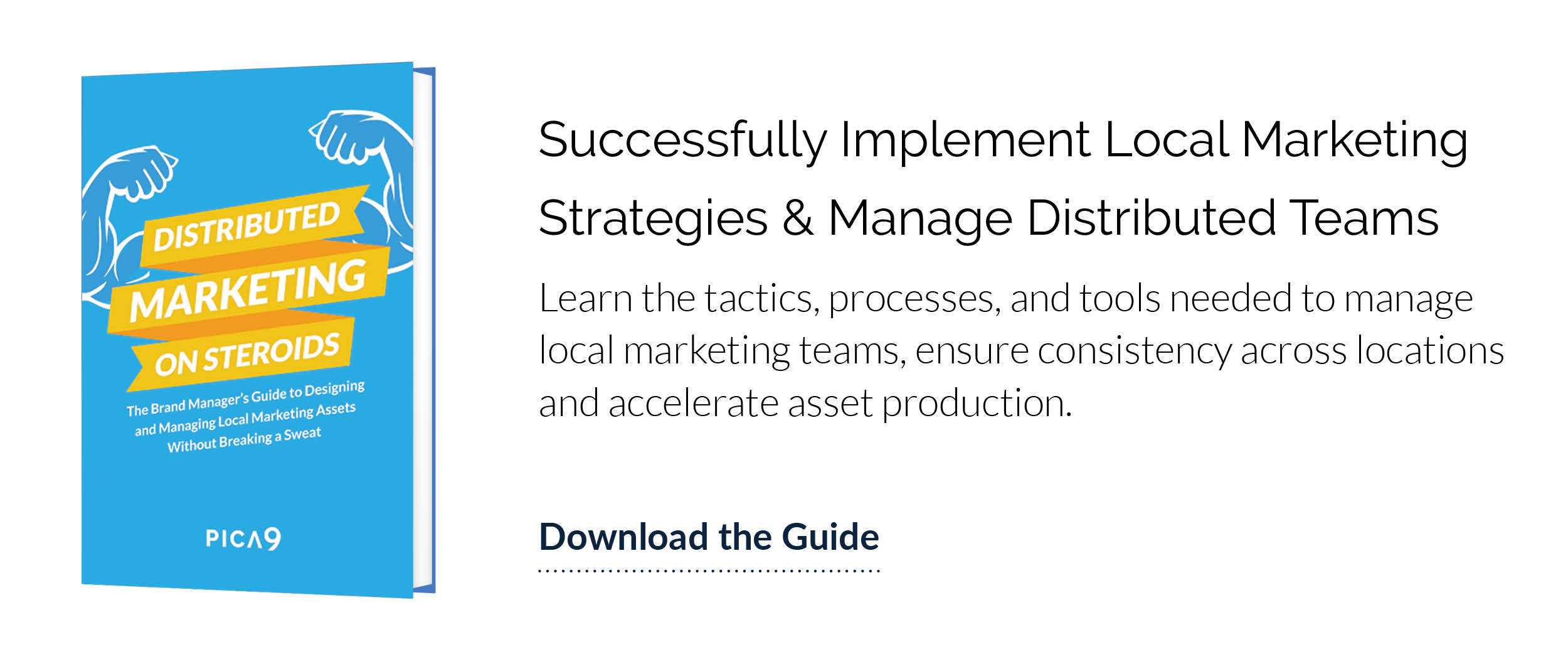Marketing may be technically defined as a "social process of value exchange," but brand managers can't measure their success with those terms. Marketing means encouraging customers to make a purchase. For local representatives of distributed brands, local marketing is the act of delivering this message for a specific geographic location and audience.
For distributed brands, supporting local marketers, and helping them to create a uniquely localized experience, is key to local success and brand equity. Even with the rise of eCommerce sales, the in-store experience remains important to brand success. Though you can buy almost everything online, Forrester research has found that, "Sometimes customers just want to visit an actual store. And when they're there, they'll expect that experience to be personal." If a brand is neglecting their local outlets, they are missing an opportunity to strengthen the relationship with current customers, and attract new ones.
The Importance of Local Marketing
The definition of "personal" can vary significantly from location to location. A rural dealership needs to execute local marketing very differently from a dealership located in a densely-populated metro area. Geography and demographics play a big role in how customers define positive brand interactions, which is a concept that has to be balanced with your national brand promise.
Local marketing is defined by geography and customers. The success of these efforts is measured by execution. As brand manager, your role involves enabling the execution. In this post, we'll examine the importance of thinking about local marketing efforts a little differently, and how to make successful execution as easy as possible for your local outlets.
Why You've Got to Think About Local Marketing Differently
At a national level, the brand marketer's job is to reinforce brand promise. You're responsible for the associations customers have with what your brand offers and values. Great branding is the reason why Nike triggers an immediate mental association with the phrase "just do it." It's why we associate BMW with quality. National campaigns create awareness of who your brand is, and what you stand for.
Local marketing is also brand reinforcement, but the purpose is very different. Whether or not you realize it, local marketing is a tool for direct response. Local marketing execution is used to pull customers into the storefront. It's used in-store to help entice people to make a purchase. It defines the customer experience by reinforcing the brand promise, leaving the customer with a feeling that your brand consistently delivers and can be trusted.
Local Marketing is All About the Customer Experience
Direct response means revenue, which is why local marketing has such an important role in the marketing mix. At McDonald's and other franchises, the branding team runs national campaigns to get the customers interested in new menu items. Local franchisees handle the logistics. They need to deliver on the brand promise of maintaining a store that "looks" like the brand and serves food that "tastes" like what the national campaign is promising.
In terms of logistics, the exact role of the local branch varies. Traditionally, marketing has been centered around direct response. Head office would run a campaign, create flyers, send out direct mail pieces, or a magazine. The goal was to drive foot traffic and business to local outlets. In today's world of eCommerce, one might think that local outlets matter less. However, this is not the case.
Some large retailers, like Target, offer "local pickup" for eCommerce purchases. Even if the store isn't responsible for making the sale, they're still responsible for a crucial part of the customer experience by completing the logistical aspects of the purchase, and delivering on the brand's promise. In this instance, local marketing is not focused on getting the customer to respond by making a purchase, but there is still the possibility of a cross-sell, up-sell, and reinforcing customer loyalty.
Empowering Brand Activation at the Local Level
Most brand managers immediately think of in-store advertising as a prime example of local marketing. Door flyers, price cards, or even massive VR events at a local branch are all examples of an in-store experience. While brand teams are responsible for designing these materials, local marketers are responsible for using them effectively.
Ultimately, local marketing is really characterized by execution. As a brand manager, you create the playbook for campaigns. Your locals aren't responsible for designing the winning play, but they are tasked with running the play by using materials correctly, and in a way that resonates with their target audience. If their execution fails, it can damage their sales and your brand as a whole. If local marketers succeed, they've achieved brand activation, defined as "creating an ardent connection between your brand and customers that motivates them."
What Your Local Representatives Need from Your Marketing Technology
Brand managers can't oversee how locals are executing marketing all the time. Empowering local marketing requires technology that supports and enables your representatives. Translating national materials into local marketing can be accomplished through distributed marketing technology for content management and templating.
When national designs for local marketing materials are converted into templates, brand managers can protect the brand promise by "locking" the local's ability to edit crucial messaging or design elements. Local marketers can then confidently add relevant local information, like location or specific pricing, to the templated materials. The end result is marketing that brings your brand to life in the mind of the customer.
As a brand manager, evaluating local marketing automation (LMA) technologies should involve an understanding of the customer experience your local marketers need to achieve:
- How easy is it for them to create and foster a positive customer experience?
- What unique challenges to creating a positive customer experience might a local outlet face? Are they located in a less engaging space, like an airport?
- How do they assess the impact of how well they are doing at facilitating an engaging and positive customer experience?
LMA needs to support ease-of-use for locals. In addition to the templating features, workflows and integrations are crucial. Ordering locally-branded mugs through merchandise partners shouldn't require more than a few clicks and a payment from a saved credit card number. Taking a completed template live on a local Facebook page doesn't need to require extra steps like downloading the asset and re-uploading it to a separate social media management tool.
Your local marketers want as much "push button" functionality as possible so they can launch campaigns in real-time. This can be accomplished by integrating you LMA tool with platforms for delivery, like social media management, print vendors and content management systems for local websites.
Create Meaningful Customer Experiences with Local Marketing Automation
The idea of "automation" isn't relevant to your local marketers. With rare exceptions, they're not really doing sophisticated, behavioral-based campaigns. More often, locals are focused on meaningful customer communications. They want to transform brand materials to fit the needs of their customers.
LMA technology gives brand management teams the ability to automate their processes with efficient template creation and asset tagging. However, the key word for success from a local's perspective is, once again, "execution." Technologies that help them generate a direct response from the customer and activate your brand promise are a win.
To learn more about improving the customer experience with local marketing automation, download our free eBook Distributed Marketing on Steroids: The Brand Manager’s Guide to Designing and Managing Local Marketing Assets Without Breaking a Sweat 




